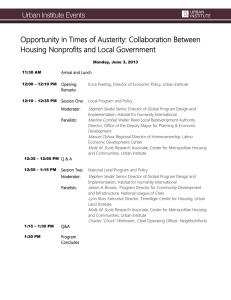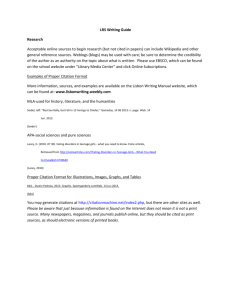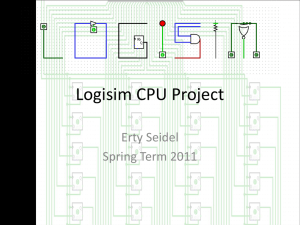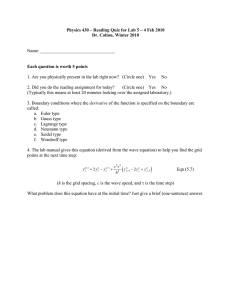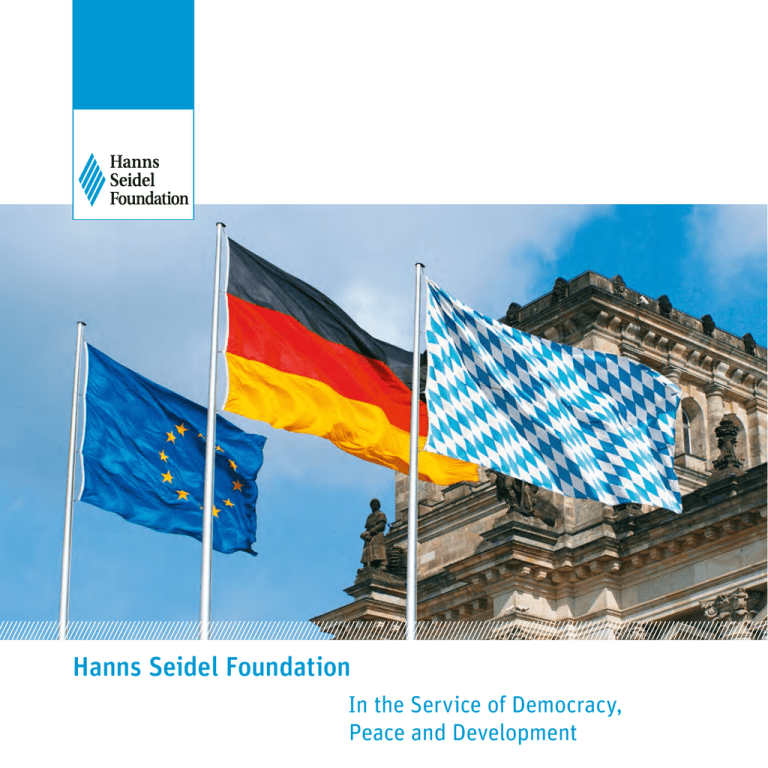
Hanns Seidel Foundation
In the Service of Democracy,
Peace and Development
u
T HE IDENTITY OF HANNS SEIDEL FOUNDATION
Democracy can only survive with a democratic minded
population. This lesson learned from the failure of the
first German Republic, the Weimar Republic, led the
Federal Republic of Germany to establish political foundations. As an important part of political culture, these
foundations would henceforth serve as a lasting and
profound anchor for democratic awareness in our country. Former German President Roman Herzog accurately
characterised them as “schools of democratic thought
and action, testbeds for civil courage and common sense
that bestow upon us the ethical principles without which
our political system cannot function.” Today, six political
foundations operate in Germany spanning the political
spectrum, each closely aligned with one party, having
gained their legitimacy through nearly complete state
funding from the German parliament. Its conscious and
intentional coexistence is practised pluralism founded
upon on a basic consensus on liberal democratic principles. “Democracy,” Herzog also said, “means that action
is as important as instruction.”
The Hanns Seidel Foundation has belonged to this family
of foundations since 1967. It was named after the former
Bavarian prime minister and CSU chairman. It is politically aligned with the Christian Social Union and engages in political education with the aim of promoting the
democratic and civic education of the ­German people
on Christian foundations. Its educational programmes
extend beyond party boundaries and are open to all interested citizens. Its commitment to democracy, peace
and development abroad also rests on these foundations. In addition, the practical actions the foundation
engages in focus on standards of human dignity and
tolerance, freedom and responsibility, solidarity and
Foundation Headquarters, Munich
Conference Centre Munich
3
sustainability, equality of opportunity and intergenerational justice as well as subsidiarity as a principle of
responsibility and structure.
A broad range of tasks has developed over the past five
decades from its original mission and purpose. This
includes dialogue between the spheres of politics, science, business and society as well as engaging in future-­
related issues, developing strategies to face national
and international challenges, teaching and practising
political skills, knowledge and abilities, supporting gifted and ­socio-politically committed students at home
and abroad, and promoting international understanding and global development cooperation. This pamphlet
aims to provide a concise overview of the wide-ranging
acti­v ities of the Hanns Seidel Foundation. We hope you
enjoy reading it and look forward to hearing from many
interested readers!
Prof. Ursula Männle
Minister of State (ret.), ­Chairwoman
4
Dr Peter Witterauf
Chief Executive Officer
HANNS SEIDEL FOUNDATION – IN THE SERVICE OF
u
OVERVIEW: MISSION AND FIELDS OF ACTIVITY
Political analysis
Political education
The conceptual and operational work of the Hanns Seidel Foundation is concentrated primarily in four departments. Whilst the Academy for Politics and Current
Affairs focuses on current trends and scholarly research,
the Institute for Political Education offers seminars on a
number of different topics. The Institute for Scholarship
Programmes fosters up-and-coming researchers with programmes that benefit talented academics who are socially
committed. The Institute for International Cooperation
operates and evaluates development cooperation projects.
The main focus here is good governance, poverty reduction
and sustainable development.
Scholarship programmes
International cooperation
globalisation and regionalisation. Here too, the focus is on
the new role of Germany and Europe in light of international conflicts and migration, the impact of the increasing
individualisation of society and questions of responsibility
for future generations.
The Central Services division provides these four departments with support as a service provider. The Banz Monastery Educational Centre and the Conference Centre at the
foundation’s headquarters in Munich represent places to
meet and engage in dialogue. The overarching guidelines
governing the foundation’s work include the relationship
between citizens and the state and the tension between
DEMOCR AC Y, PE ACE AND DE VELOPMENT
5
u
P OLICY ADVICE – DEVELOPING STRATEGIES AT THE
ACADEMY
The Academy for Politics and Current Affairs addresses
(socio-)political issues and analyses trends. It considers
itself a think tank and brainstorming forum for politics and
society.
Its work aims to act on current and relevant challenges/
issues in order to develop problem-solving strategies in
the most important areas of political, social and economic
life and offer practical policy solutions. Policy advice and
policy analysis are done in dialogue: policy-makers discuss current issues with leaders from academia, the business world, society, culture and the media.
The Hanns Seidel Foundation Academy differs from other
political research institutions, including by the fact that
issues are addressed by experts from different fields. An
interdisciplinary approach is a prerequisite for being able
to adequately unravel the complexity of national societies
and the international political and economic system.
The outcomes of this process are prepared for the media
and made available to decision makers.
Maximilianeum in Munich
Bavarian Landtag
6
Reichstag building in Berlin
German Bundestag
HANNS SEIDEL FOUNDATION – IN THE SERVICE OF
u
P OLITICAL EDUCATION – SEMINAR PROGRAMMES FOR
EVERYONE
What literature describes as civics is a focus of seminars
and conferences held by the Institute for Political Education. Activities centre on citizens who want to improve
their political skills. Since the Institute was founded, several hundred thousand interested citizens have participated in seminars, conferences and workshops to gain
specific, topical knowledge.
The range of topics is extremely diverse, ranging, for example, from migration and the resulting refugee issue to
questions of successfully managing the energy transition
to issues specific to families and women. Business and
media ethics, democratic competence, digital revolution,
international security policy, values, religion and society –
to name just a few – are the topic of educational events.
Political education also aims to provide people with qualifications for political engagement. It seeks to strengthen
democratic awareness and provide tools for volunteering.
The benefits for individuals include gaining socio-political
skills and a better understanding of democratic voting
processes; in short, the ability to engage in civil society
and take political action.
These events are held at our Educational Centre at the Banz
Monastery, the Conference Centre Munich or in various
parts of Bavaria.
Educational Centre at the Banz Monastery
DEMOCR AC Y, PE ACE AND DE VELOPMENT
7
u
S CHOLARSHIP PROGRAMMES – TALENTED INDIVIDUALS
RECEIVE SUPPORT
Scholarship programmes enrich studies – and not just
financially. More than 1,000 fellows receive a scholarship
from the Institute for Scholarship Programmes. These
scholarships consist of both conceptual and financial
support. The aim is to contribute to the education of personally and academically qualified young academics and
to reward outstanding scholarly achievements in doctoral
programmes. Conceptual support here means participating in courses aimed at enabling fellows to critically
and constructively contribute to the development of the
democratic rule of law. Their political, professional, social and personal skills are primed, which should provide
broader foundations for their future leadership capabilities. Those receiving a scholarship are chosen by a selection committee based on the combination of personality,
performance and social engagement.
8
In addition to course-related support programmes, fellows
often take on societal and social leadership responsibilities. They are aware of their roots and remain in contact
with the foundation. The scholarship alumni club has
around 2,000 members.
That this is the right path is evidenced by the fact that former fellows have risen to lead companies, associations
and organisations, with many involved in policy-making.
HANNS SEIDEL FOUNDATION – IN THE SERVICE OF
u
D EVELOPMENT COOPERATION AND POLITICAL CONTACTS
WORLDWIDE
Global challenges today can only be tackled through global
cooperation. One player in this process is the Institute
for International Cooperation, with projects in over
60 countries worldwide. The aim of this international
engagement, which is based on Christian social ideals,
is to promote humane living conditions and to contribute to sustainable development by strengthening peace,
democracy and social market economies. Together with
local partners, projects are implemented that focus on
strengthening civil society and its organisations, public
participation and promoting the rule of law, advising
decision makers in politics, business and administration,
promoting women, overcoming social and ethnic divisions
and strengthening environmental awareness.
DEMOCR AC Y, PE ACE AND DE VELOPMENT
These programmes are complemented by the Hanns Seidel
Foundation maintaining contacts with the world’s major
centres of political power. The foreign offices in Washington (the US and Canada), Moscow (Russian Federation),
Brussels (Benelux, the EU and NATO) and Athens (Greece)
have close ties to the politically influential organisations
and institutions in the respective country. They organise
local bilateral symposia, prepare analyses and lead dialogue programmes.
The Hanns Seidel Foundation is a respected global partner
on issues of democracy, the rule of law and contacts with
Germany.
9
South African Ombudswoman Thulisile Madonsela Promoting environmental sustainability and
at the Women’s Breakfast in Windhoek
environmental awareness
Panel discussion on poverty reduction in Africa
Dialogue of religions and cultures as well as meas- Ursula Männle with the Vice President of the
ures for more sustainable economic and social policy All-China Women’s Federation
Visit to the Urumqi vocational school
Youth Parliament in Bolivia
10
Members of the Burkinabe Constitutional Council Meeting for police officers in Southeast Asia
at a seminar
HANNS SEIDEL FOUNDATION – IN THE SERVICE OF
u
CONTACTS IN CITIES
Munich: Foundation headquarters and Conference Centre
Washington: Transatlantic contacts in the US and Canada
The foundation headquarters of the Hanns Seidel Foundation and its Conference Centre are located in Munich. In
addition, it has its Educational Centre at the Banz Monastery in Upper Franconia and a representative office in Berlin
Mitte. Abroad, the foundation has approximately 60 offices
in charge of local projects, including in Beijing, New Delhi,
Jakarta, Johannesburg and Buenos Aires. Its offices are also
open for dialogue programmes in major political capitals
like Washington, Brussels, Moscow and Athens.
Brussels: European affairs and development policy dialogue
Berlin: Public relations with the political sphere, associations and
organisations
DEMOCR AC Y, PE ACE AND DE VELOPMENT
Moscow: Contacts and dialogue programmes in the Russian Federation
11
u
A RCHIVE FOR CHRISTIAN SOCIAL POLITICS
and parliamentary group collections. In addition, personal
documents of notable CSU politicians are held. The ACSP
therefore serves as the historical “memory” of the Christian Social Union.
Party archives are considered service facilities that provide information on various media (photos, video and text),
be it for scholarly work, policy work or citizens’ requests.
Collections are available in analogue and digital formats.
They constitute relevant sources of party history.
Political foundations maintain party-affiliated archives that
are open to everyone. The Archives for Christian Social
Policy (ACSP) is tasked with collecting, developing and
making accessible resources for the development of the
Christian Social Union as well as for conducting its own research. The aim is to achieve the most comprehensive documentation of the conception and development of the CSU
and the activities of its functionaries and parliamentary
groups. The ACSP documents and researches predecessor
organisations, primary political and social movements and
their historical roots. At the heart of this lies documentation on leading party figures, state, district and local levels
12
One challenge the archives face in our modern media age
is making digital transmission secure and usable. Along
with electronic databases from file and document management systems, databases of websites and politicians’ social
networks accounts are also secured. Retro-digitisation of
analogue documents and objects is used for conservation
purposes and allows for comprehensive and location-independent access to the archives.
HANNS SEIDEL FOUNDATION – IN THE SERVICE OF
u
T HE EPONYMOUS HANNS SEIDEL
tag (state parliament). In September 1947, Prime Minister
Hans Ehard appointed the expert Hanns Seidel Bavarian
State Minister of Economics. The CSU parliamentary group
elected him their spokesperson in 1954, making him the
opposition leader to the Coalition of Four (SPD, Bayernpartei, FDP, GB/BHE). In 1955, as the new party chairman,
along with his Secretary General, Friedrich Zimmerman,
he began a fundamental modernisation and reorganisation of the CSU. When the Coalition of Four collapsed in
1957, the CSU once again formed a government and the
Landtag appointed Hanns Seidel Minister President of the
State of Bavaria by a majority. The population rewarded
Seidel’s expertise and gave the CSU its best outcome since
1946 in the 1958 regional elections with nearly 50 % of
the vote. It was with great regret that Seidel was forced to
resign as Minister President in 1960 and CSU party chair
the following year due to a back injury he suffered in an
accident. Hanns Seidel died as a result of his injuries on
5 August 1961. A few months later, planning began for a
foundation affiliated with the party and was named after
Hanns Seidel.
Hanns Seidel (1901–1961) was born in the Bavarian town
of Aschaffenburg and earned his law degree in 1929. He
became a member of the Bayerische Volkspartei (BVP) in
1932 and the next year ran in the city council elections
in his home town. After the Nazis took power, Seidel was
taken into “protective custody” because he had been protecting a large number of Jews. Hanns Seidel served in
the military from 1940–1945. Once the war was over, the
American military government appointed politically respectable Seidel District Administrator of Aschaffenburg.
In 1946, he successfully ran for election as a CSU candidate for the Constituent Assembly and the Bavarian Land-
DEMOCR AC Y, PE ACE AND DE VELOPMENT
13
u
T HE FOUNDATION AS A NETWORK
Because of its engagement as a socio-political ­educational
institution and player in development cooperation, the
Hanns Seidel Foundation has access to a global network.
Contacts in Germany and abroad have been fostered over
the course of decades. As a party-affiliated organisation,
good relations with associations, churches, various cultural institutions and especially the educational sector and
the world of academia have resulted. The network is complemented by countless contacts with people whose ideals
align with those of Christian socialism, and this of course
includes our current and former fellows. The focus here is
on multipliers who want to engage in conversation with
14
the Hanns Seidel Foundation. As a platform for socio-political discourse on various topics, the Hanns Seidel Foundation promotes the exchange of opinions.
Our recognised expertise in development cooperation has
given us ties to governments, parliaments and heads of
state in more than 60 countries. Our local project partners
are closely involved with civil society in their respective
countries.
Today, the Hanns Seidel Foundation is involved in educational projects in Germany as well as over 60 countries
around the world. The CSU-affiliated foundation’s motto is: In the Service of Democracy, Peace and Development.
Representatives of the Hanns Seidel Foundation
Legal Notice
PublisherCopyright 2016
Hanns-Seidel-Stiftung e.V.
Lazarettstr. 33
80636 Munich, Germany
Tel.: +49 (0) 89 1258-0
Fax: +49 (0) 89 1258-356
E-mail: info@hss.de
Website: www.hss.de
ChairwomanProf. Ursula Männle,
Minister of State (ret.)
Chief Executive OfficerDr. Peter Witterauf
Head of Press and Hubertus Klingsbögl (responsible
Public Relationsunder German Press Law)
Design
formidee Designbüro, Munich
Print
Vögel Druck und Verlag, Stamsried
Photo credit: p. 5 from left to right: R. Berold/adpic.de, rrrob/fotolia.com,
D. Cervo/­fotolia.com, dr322/fotolia.com; p. 6: ah_fotobox/fotolia.com (left),
Berlin85/­fotolia.com (right); p. 8: D. Cervo/adpic.de (left), Alexander Raths/
fotolia.com (right); p. 9: Hxdbzxy/clipdealer.de; p. 11: kameraauge/­fotolia.com
(bottom left), Vacclav/fotolia.com (top right), Jorisvo/istockphoto.com (­middle
right), yulenochekk/fotolia.com (bottom right); p. 14: psdesign1/fotolia.com;
title photo: R. Berold/adpic.de und xyno/istockphoto.com (design by formidee);
all other photos: HSS/ACSP
All rights reserved, including the right of reproduction, distribution and translation. No part of this work may be reproduced or processed, duplicated or
distributed using electronic systems in any form (photocopy, microfilm or other
procedure) without written permission from the Hanns Seidel Foundation e.V.
The Hanns Seidel Foundation e.V. holds the copyright for this publication.
For those interested in the work of the Hanns Seidel Foundation, various peri­
odicals may be requested. Our website provides an overview: www.hss.de/
publikationen.html (German only).
The foundation’s newsletter (sent three times per year) and the annual report
sent via a distribution service. If you are interested please send an email to
info@hss.de or a letter to the Department of Press and Public Relations (see
above for postal address).
Hanns Seidel Foundation
Lazarettstr. 33
80636 Munich, Germany
+49 (0) 89 12 58-0
+49 (0) 89 12 58-356
info@hss.de
www.hss.de/english.html
BNr. 0150-1605EN
A detailed presentation of the work of the Hanns Seidel Foundation is available on
the Internet. You can register, order publications and read conference or country
reports at www.hss.de. In addition to its website, the Hanns Seidel Foundation
also uses several social media channels:
Hanns-Seidel-Stiftung
HSS
Hanns-Seidel-Stiftung
www.hss.de


